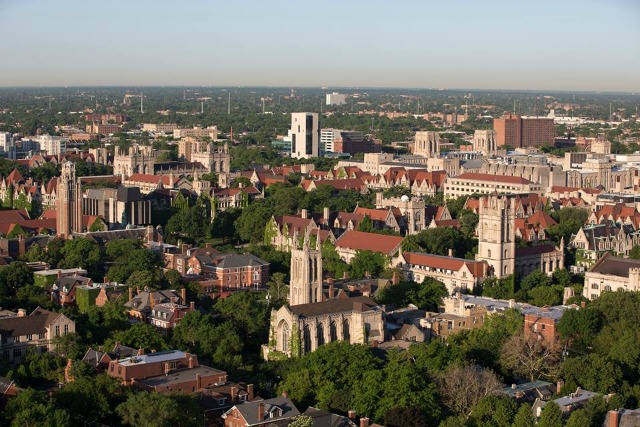A UChicago Alum Tells Us Why Trigger Warnings And Safe Spaces Matter
By Chicagoist_Guest in News on Aug 26, 2016 5:50PM

University of Chicago / Facebook
By Cassandra Walker
This week, the University of Chicago’s administration gave its incoming undergraduate class a taste of hypocrisy.
In a letter to new students, Dean of Students John (Jay) Ellison states that the university “does not condone intellectual safe spaces” and that they “do not support trigger warnings.” (Trigger Warning: This article mentions sexual assault and UChicago’s past mistreatment of students. This is how trigger warnings work—they’re a kind of heads-up, not a form of censorship. More on that in a minute.) In practice, safe spaces and trigger warnings help people. They can foster respect and meaningful dialogue.
As a graduate of the University of Chicago who is a queer woman of color, I find this letter disgusting, but sadly not surprising. The university is under federal investigation over claims it violated Title IX, has had a speaker openly insult and mock a trans student, and has seen The University of Chicago Police Department arrest a black student under questionable circumstances in the library, among other issues. It boggles the mind that this institution’s administration can’t seem to conceive of people who have experienced trauma existing—or why it does those people a disservice to condemn the practices of providing a trigger warning or safe space.
Although the university's stance is hypocritical and perplexing, it’s not shocking or new—it already jives with my experience as a recent student and the experiences of many other students on campus. As a woman who has experienced sexual assault, I was denied help and services by the university’s own student counseling center while a student. As a black student, I have watched the university largely ignore its police department’s racial biases. As a person who struggled with mental health, I’ve seen the administration force students into long hospitalizations and leaves of absence from school. As a queer student, I’ve sat through class discussions that ignored or openly demeaned my and my friends' identities. I am, however, saddened and angry nonetheless, because the tone-deaf declarations in this letter actually jeopardize student safety.
There’s a backlash against a perceived culture of “political correctness”, and part of the problem is that people do not understand what intellectual safe spaces and trigger warnings are supposed to be. (That, or they simply don’t care about their fellow human beings.) So let me explain what I am defending here: I am defending basic human decency. I am defending the idea that if we wish to be a functioning, forward-thinking society, we have to at least demonstrate some empathy for other people. That’s what trigger warnings do—they are no different than letting parents know that a movie or music contains violent and sexual content. That music and those movies are still released, they just won’t be played in certain places; people have the ability to decide for themselves how much caution they need to exercise when and if they engage with that media.
Why is it wrong for a sexual assault survivor to want to know whether the class they might take will contain graphic discussion or depictions of rape? Why doesn’t that person deserve the ability to decide whether it is too soon in their healing process for them to engage academically with that material? Epilepsy warnings for strobe lights, allergy warnings on food packaging, high voltage signs on electric fences—these are all trigger warnings. They warn that something might cause a reaction for some people because we understand that people are different and should be informed about potential risks.
And informed consent is good ethics; just ask the University of Chicago’s Institutional Review Board. They will reject your study if you don’t inform people of risks, even if the risk sounds minor, i.e. a risk of feeling slightly cold, or a risk of eye strain. So why would the university want to fight against protecting the minds of students as well?
This week I started working toward my Masters of Social Work at the University of Illinois at Chicago. In my first class, my professor stated that she wants our classroom to be a safe space to explore complex and even triggering topics. She presented some rules to make that possible—rules that said we should assume good intentions from our classmates and think before we attack or say something vitriolic. Not a single rule suggested that students shouldn’t talk about hard things. But the rules did say we could take a moment away from class if a conversation triggers us. They also said we could share, or not share, that experience with the professor or class as we saw fit.
These rules make that class feel comfortable. They make me want to have open discourse even if I disagree with my cohort or professor. They create just the kind of intellectual safe space where we can feel ready to dig into uncomfortable, tough subjects. They let us know that malicious intent is not OK, but that personal biases, thoughtful dissent and mistakes will be met with understanding, compassion and respectful dialogue.
That is what an intellectual safe space is supposed to do. This is what a trigger warning is. That is what the University of Chicago’s deans of students are saying they don’t condone. They are not saying that they want to fix safe spaces that have turned to censorship—or even that this is necessarily a problem at the University of Chicago. Though the Dean of Students claims the university values diversity, inclusion, and mutual respect when recruiting students and donors. This letter shows the administration's willingness to wash their hands of responsibility for creating an environment where the life of the mind is actually protected. This is not good for students or academic discourse.
Cassandra Walker is a masters of social work student at the University of Illinois at Chicago and a 2013 graduate of the University of Chicago.